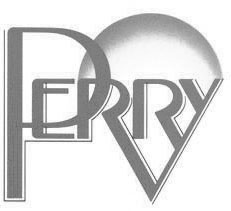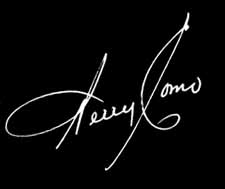 "I just
open my mouth at eight o'clock
and out it
comes"
"I just
open my mouth at eight o'clock
and out it
comes"
Very few singers can match the
durability of Perry Como, whose performing career now spans more than
four decades. He began as a band singer in 1933 and ten years later
signed with RCA, the company he has recorded for ever since. Thirteen of
his singles have earned gold records, as have two of his albums. And he
is still going strong: early this year he was nominated for a Grammy
Award (for his recording of And I Love You So), in May he made
his first concert appearance in London, and in July RCA issued his
latest album, "PERRY".
Como is aware of his longevity, but
he doesn't particularly like to dwell on it. "I don't mind
being sixty-two, I just don't like to look and feel sixty-two," he
says. He didn't really feel anywhere near his age until two years ago
when he broke his left leg in a freak accident, falling off a rehearsal
stage in Los Angeles. It laid him up for months, and it still gives him
trouble. "It was such a dumb thing. I never dreamed I'd break the
whole thing. I'm not the sick type, but I guess we're all destined for
something like this at least once in our lives. What I hate about age is
that the body starts crackin' up. It's the most boring thing in the
world and there's nobody I dislike enough to wish it on. I really didn't
need this - my legs look like they're on backwards anyway."
In person, except for the slight
limp he may always have now as a result of the accident, he looks the
same as he did on his fifteen-minute television shows in the early
1950's. Up close, his hair is quite white, but most of it is still
there, and when he gets on stage it magically looks dark with just a few
flecks of gray. This sameness of appearance and style (although half of
his songs may well be very new ) is perhaps the major reason
he gets $100,000 a week for performing at the Las Vegas Hilton, the only
night club he'll agree to play, and why he fills the room every night of
his annual two-week engagement.
Self-aware and self-deprecating,
Como is always telling little jokes about himself. Since the accident
has severely limited his capacity for walking and standing, he keeps
threatening "to come out on stage in a golf cart." And he
says, "Between shows I drink a cup of soup and put all of Bing's
records on the record player to see if I'm doin' right. As for training
and rehearsal, perish the thought. What is there to train? I've never
studied singing; I don't have much of a voice. I don't practice; maybe I
should, but I don't. I just open my mouth at eight o'clock and out it
comes, hopefully. Some night you may hear the biggest nothing. But as a
kid I did play the trombone. You know, all Italians play guitars and
checkers. And I know I can always get a job in a barber shop."
Relaxed is the Como image, in a
word, and relaxed is what he seems offstage, in his casual royal-blue velour
shirt, gray slacks, white sweat socks, and moccasins, telling about his
career. Even his leisure-time recreations are the most tranquil kind -
golf, boating, and fishing - and he keeps wandering back to them in
conversation, as if all this show-business stuff were an intrusion,
although a pleasant one.
Perry was born May 18, 1912, in the
Pennsylvania mining town of Canonsburg, and he could have faced a
lifetime of toil in the coal pits except that when he was eleven years
old he got a job in Steve Fragapane's three-chair barber shop. He
stropped razors, swept the hair up from the floor, and apprenticed
himself to the barbers until he was barbering and shaving customers
himself. He opened his own shop before he finished high school,
entertaining his customers with the popular songs of the early 1930's.
Since some of his customers were traveling band musicians, he was soon
offered a job. He gave up the steady $ 125 weekly he made barbering and
accepted $28 a week to sing with a dance band. Just turning twenty-one,
he married a home-town girl, Roselle Belline
"I was singing with Freddie
Carlone's band in Warren, Ohio, in a gambling casino in 1936 when Ted
Weems came in. He won at roulette and then came downstairs to hear me.
He offered me the job to replace Art Jarrett at $50 a week. Marilyn
Maxwell was also singing with the band, but she was known as Marvel
Maxwell then."
The job with Weems lasted until
1942, when the shortage of manpower and the difficulty of traveling
brought on by World War II forced Weems to disband. Perry went back to Canonsburg
ready to resume cutting hair, but the era of crooners was quickly
emerging out of, and taking over from, the era of the big bands. Crosby,
Sinatra, Dick Haymes, and others began to dominate entertainment on the
male side, and Perry Como got a call to do his own New York radio show
at $100 a week. "I did a fifteen-minute show five times a week at
8:00 p.m., and then we repeated it again for the West Coast at
11:00."
RCA offered him a contract in 1943
and released Goodbye, Sue. In 1944 he made a movie, Something
for the Boys, started his NBC radio series The Chesterfield
Supper Club, and made his night-club debut at the Copacabana in New
York. Three of the records he made in 1945 sold more than a million
copies each: A Hubba Hubba Hubba, Till the End of Time, and
Temptation. Other million-sellers followed regularly, including Prisoner
of Love (1946), When You Were Sweet Sixteen (1947), and Forever
and Ever (1949). His show The Chesterfield Supper Club made a
successful transfer to television in 1950 and was done live three times
a week. And the succession of hits continued: No Other Love, Wanted,
Don't Let the Stars Get in your Eyes, Round and Round, Papa Loves Mambo,
Home for the Holidays, Hot Diggity, Seattle, Catch a Falling Star and
Magic Moments. After a couple of years on television he had switched
to a weekly hour-long show, and this went on until 1958, when he began
signing multimillion-dollar contracts for TV specials. And they keep
rolling along. "Usually, it's all settled with a handshake every
three years," he says. The Kraft Music Hall alone made him
more than $25 million between 1959 and 1968.
"I've been doing this for forty
years. I can't put up with it much longer," he says laughing.
"All the people who remember Temptation are dead. It sounds
dated, and so I now do it with a different arrangement. I stole a couple
of things from Shaft. I'm not trying to be a hippy, and I'm not going to
do rock-and-roll. But my sounds are attuned to the times." About
half of his performance material is made up of familiar oldies and half
of new songs not associated with him. Perry still uses the Ray
Charles Singers as his backup; the composition of that group changes
constantly and now consists of a dozen kids assembled for Perry's
decreasingly frequent appearances.
He admits to never having worked
very hard as an entertainer. " Take away the cue cards on TV and
I'm lost. I can't get past 'hello.' Even with lyrics. Once I had to sing
Night and Day on a show and as many times as I had sung it, I had
to read the cards. Somebody goofed and I sang the second half first and
then the first half second and didn't even know it until the show was
off the air."
Wife Roselle, who stays so far in
the background of her husband's career that she won't even go to his
opening nights, has concentrated on their marriage and motherhood.
The Como's have three children, all married, and eight grandchildren,
the oldest of whom is twelve. All come to visit Perry and Roselle
frequently in Jupiter, Florida, which has been their full-time home
since the Como's sold their Sands Point, Long Island, house two
years ago. Jupiter is eighteen miles north of West Palm Beach and eighty
miles north of Miami.
"Sometimes I get tired of
fishin' and playin' golf," he says, "but most of the times I
can stay out in the boat all day." On the other hand, he admits,
"When you step out on stage things do happen. The relaxed thing
comes from the people; I sense it in two seconds, and they do too. The
years I've been there make me feel at ease. They are old friends. After
forty years, where can I go? My wants and needs are so small. I can be
out in my boat all day. I can come to Las Vegas and sing all day. Life
has become even more beautiful because I can pick any spot and do just
what I want to do." After forty years, that seem about right.
Robert Windeler
STEREO REVIEW MAGAZINE
OCTOBER 1974 pp 69-70





